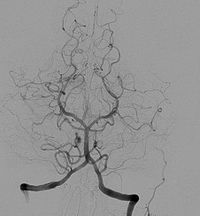
Photo from wikipedia
Whole-brain four-dimensional computed tomography angiography (W4D-CTA) using a 320-row area detector CT (320r-ADCT) has been applied before thrombectomy. Endovascular physicians require images with high interrater reliability (IRR) for making appropriate… Click to show full abstract
Whole-brain four-dimensional computed tomography angiography (W4D-CTA) using a 320-row area detector CT (320r-ADCT) has been applied before thrombectomy. Endovascular physicians require images with high interrater reliability (IRR) for making appropriate decisions. However, the 320r-ADCT gantry cannot be tilted, and the patient’s head position influences the anteroposterior (AP)-view W4D-CTA images. This study aimed to determine which W4D-CTA images are appropriate pre-thrombectomy, whether the unedited AP view or cut-out Towne view. This study included the W4D-CTA images of acute stroke patients with occlusion of the internal carotid artery or the middle cerebral artery (MCA) from April to July 2021. Images produced by 320r-ADCT were transferred to a workstation. Unedited AP-view images were automatically generated. Towne-view images were cut out for this study. Collateral status was evaluated as poor, intermediate, or good based on the visualization of the MCA peripheral branches. In addition, the IRR was assessed using intraclass correlation coefficients (ICC) (2,1). Fifteen patients were analyzed. In the unedited AP-view and cut-out Towne-view W4D-CTA images, the ICC (2,1) were 0.147 and 0.796, respectively. Cut-out Towne-view W4D-CTA images with substantial IRR are superior to the unedited AP-view images for assessing the anterior intracranial collateral status.
Journal Title: Diagnostics
Year Published: 2022
Link to full text (if available)
Share on Social Media: Sign Up to like & get
recommendations!